Reconciling with God’s Creation
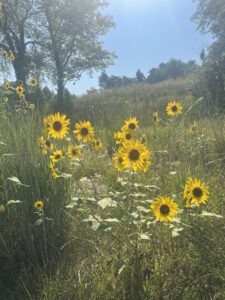
Sunflowers in bloom at Precious Blood Renewal Center
by Tim Deveney, Precious Blood Volunteers Director
Following an unusually hot spell in September, we were blessed with more normal temperatures in Kansas City. It’s been a lot nicer to take my post-lunch walk around the grounds of the Precious Blood Renewal Center. I love walking over on the southeast side of the lake. The gravel path follows the grassland that was planted a few years ago, ringed by an ample number of trees.
The seasons reveal different new glories as the growing season moves forward. The spring reveals the greenish blue of the native grasses. These are followed by coneflowers of different hues. In August and September, the sunflowers extol the glory of God with their yellows ringing rich black. Then the goldenrod takes its turn to show off. The natural beauty of this prairie and forest is in stark contrast with the noise of the interstate and the looming gray ugliness of the newly built warehouse just across the parkway.
One day when I was walking along this path, it struck me that by devoting this section of land to native plants, we are engaging in an act of recon- ciliation with God’s creation. A good chunk of the land we are entrusted with at the Renewal Center is devoted to trees and grasslands. These native prairie grasses and flowers are beautiful and surprisingly resilient. Most important, they do great work in offsetting some of the worst actions we have taken to hurt the Earth and God’s creation that inhabits it. These grasslands do not require the hours of mowing by machines that consume fossil fuels and produce localized pollutants and noise.
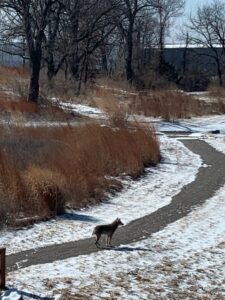
Coyote at Precious Blood Renewal Center
This rewilded area supports a biodiverse area for plants and animals. The grasses, flowers, and trees provide expanded habitat for bugs and a surprising number of animals. Since that part of the Renewal Center grounds was converted from lawn to prairie, there has been a notable increase in the fauna there. It is not unusual to see deer, turtles, snakes, coyotes, and birds of all kinds.
These native grasses, flowers, and trees reduce the impact of localized and regional flooding and erosion. They do this by absorbing rainwater into the ground through their own water needs and channeling water deeper into the ground through their extensive root systems. They also do a more effective job of holding topsoil in the ground than lawn grasses do. These plants can help filter out some manufactured contaminants before they reach surface water.
In addition, these plants effectively absorb greenhouse gasses, which Project Drawdown, an organization working to stop human-caused climate change, describes as a “carbon sink.” They do this much better than a manicured lawn.
Reconciling with the Earth is a small act of reconciliation. It should be a part of broader efforts by all of us as individuals, as a Precious Blood community committed to renewal and reconciliation, to care for our common home and a reframing of how we view and treat it.
Pope Francis writes in “Laudato Sí” that “[Mother Earth] cries out to us because of the harm we have inflicted on her by our irresponsible use and abuse of the goods with which God has endowed her.” He continues: “We have come to see ourselves as her lords and masters, entitled to plunder her at will.”
He challenges all of us even more firmly with quotes from Orthodox Patriarch Bartholomew “for human beings … to destroy the biological diversity of God’s creation; for human beings to degrade the integrity of the earth by causing changes in its climate, by stripping the earth of its natural forests or destroying its wetlands; for human beings to contaminate the earth’s waters, its land, its air, and its life—these are sins” since “to commit a crime against the natural world is a sin against ourselves and sin against God.”
Embracing this challenge requires us to have a change of heart. Pope Francis cites his predecessor Pope Benedict in a call to find the way of love, which is moving from our own individual wants and desires to what God’s world needs. This means liberating ourselves from fear, greed, and compulsion.
Changing our hearts should lead us to deeper reconciliation with our common home and each other. Action should follow our turning away from the sin against nature. Our actions need to include reducing emissions of greenhouse gasses and other pollutants by using less and becoming more energy efficient. Better efficiency can be achieved through technological tools that include renewable sources of energy and technologies such as higher efficiency light bulbs and means of transportation.
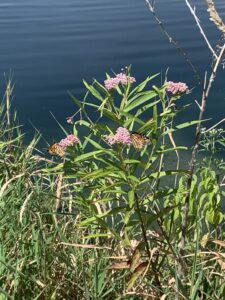
Monarch butterflies on wildflowers at Precious Blood Renewal Center
However, we are not going to be able to use technology to get us out of this crisis. A major part of this is reordering our lives to use less. It means shaping our communities in ways that reduce dependence on automobiles and prioritize walking, bicycling, and public transportation. It will require us to think about how much waste we produce through non-reusable items and other consumer goods that have short useful lives that end up in landfills or as litter. We will need to think about our food systems that produce a great deal of waste and greenhouse-emitting byproducts. The waste from spoilage of food is especially troubling since a good deal of that could go to feeding people.
Our overuse of land for agriculture and other commercial purposes also takes away from wild areas. These wild environments, on a larger scale than what is happening at the Renewal Center, need to be protected and expanded. Wild areas are wonderful carbon sinks. They are our best way to reduce the amount of greenhouse gasses currently in our atmosphere. They have the added benefit of protecting and promoting biodiversity, while ensuring the longevity of our sources of freshwater.
Tim Deveney is director of Precious Blood Volunteers and a member of the US Province’s Justice and Peace Committee.

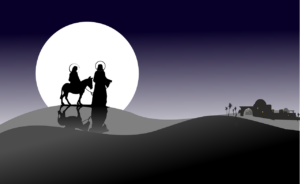 One of my fondest childhood memories of Advent was celebrating the Novena known as Las Posadas that takes place from December 16 to December 24. This is a Mexican Advent tradition commemorating the journey that Joseph and Mary made from Nazareth to Bethlehem in search of safe lodging (Posada) where Mary could give birth to the baby Jesus. Not finding a place of welcome in the crowded inns of Bethlehem, Joseph and Mary were forced to seek shelter in a nearby stable.
One of my fondest childhood memories of Advent was celebrating the Novena known as Las Posadas that takes place from December 16 to December 24. This is a Mexican Advent tradition commemorating the journey that Joseph and Mary made from Nazareth to Bethlehem in search of safe lodging (Posada) where Mary could give birth to the baby Jesus. Not finding a place of welcome in the crowded inns of Bethlehem, Joseph and Mary were forced to seek shelter in a nearby stable.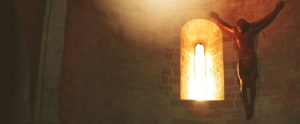 from Gabino Zavala, Justice and Peace Director
from Gabino Zavala, Justice and Peace Director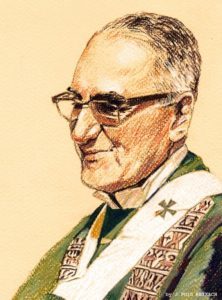 “I don’t believe in death without resurrection.”
“I don’t believe in death without resurrection.”